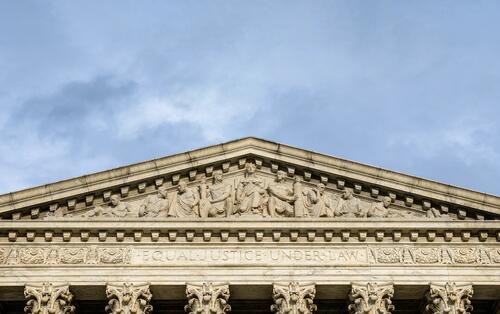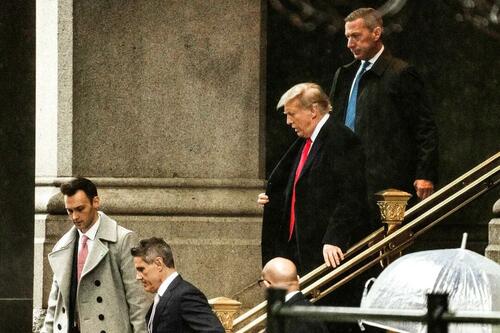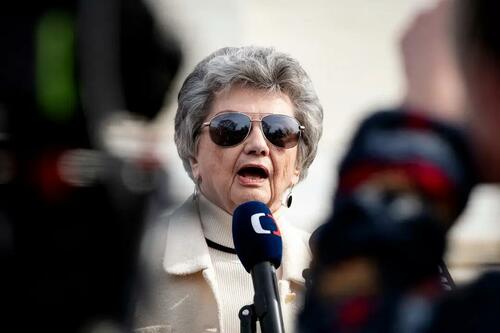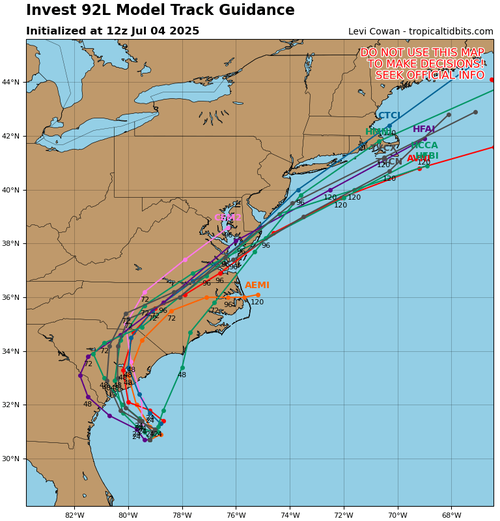
The Biggest Supreme Court Decisions Of 2024
Authored by Sam Dorman via The Epoch Times (emphasis ours),
The Supreme Court made a wave of historic and game-changing decisions in 2024 on topics ranging from presidential immunity to social media and ballot disqualification.
 The U.S. Supreme Court in Washington on March 10, 2020. Samira Bouaou/The Epoch Times
The U.S. Supreme Court in Washington on March 10, 2020. Samira Bouaou/The Epoch TimesThe presidential election combined with rising administrative law disputes helped tee up controversies that put the court and its decisions in the spotlight. Legal precedent flowing from those decisions created rippling effects for other cases and how entire branches of government are expected to make decisions.
Here are several of the biggest cases this term.
Presidential Immunity (Trump v. United States)
One of the most politically controversial cases this term stemmed from President-elect Donald Trump’s now-dismissed election interference case in Washington. In Trump v. United States, Trump appealed the case with the argument that under the Constitution, presidents should enjoy immunity from criminal prosecution.
It was the first major Supreme Court precedent establishing presidential immunity since 1982 in Nixon v. Fitzgerald, wherein the court held that presidents enjoy immunity from civil liability for actions taken within the outer perimeter of his duties.
By taking up the case earlier this year, the Supreme Court created a lengthy delay for the pre-trial process and the case was eventually dismissed because of Trump’s election win. The court’s decision set a major historical precedent by outlining the contours of criminal immunity. For unofficial acts, presidents are not immune, while for official acts, presidents enjoy certain levels of immunity, according to the decision.
The majority offered some broad guidance on distinguishing between official and unofficial acts but acknowledged that doing so “can be difficult.” Chief Justice John Roberts said that lower courts should not inquire into a president’s motives and that they could not deem something unofficial “merely because it allegedly violates a generally applicable law.”
While courts should base their distinctions on what a president’s discretionary authority entails, some conduct could qualify “even when not obviously connected to a particular constitutional or statutory provision.”
Trump has attempted to apply that decision to his other criminal cases, including one still playing out in New York. For example, Trump argued in New York that prosecutors improperly used evidence, including testimony, that was prohibited under the immunity decision.
 Former President Donald Trump departs the Waldorf Astoria where he held a press conference following his appearance in a court in Washington on Jan. 9, 2024. The D.C. Appeals Court held a hearing on the former president’s claim that he is immune from prosecution in the 2020 election case. Kent Nishimura/Getty Images
Former President Donald Trump departs the Waldorf Astoria where he held a press conference following his appearance in a court in Washington on Jan. 9, 2024. The D.C. Appeals Court held a hearing on the former president’s claim that he is immune from prosecution in the 2020 election case. Kent Nishimura/Getty ImagesHowever, New York Supreme Court Justice Juan Merchan said that the evidence in question related “entirely to unofficial conduct” and was therefore not protected.
It’s unclear how exactly the new precedent should be applied, and future cases involving presidents could help iron out the details. While the Supreme Court offered a broad outline of immunity, it remanded Trump’s election case in Washington for further determinations by the lower court regarding specific conduct. The case has since been dismissed.
Ballot Disqualification (Trump v. Anderson)
Before the immunity ruling in June, Trump prompted another historic ruling from the high court in March. In Trump v. Anderson, the court wrestled with how to interpret a provision of the 14th Amendment that disqualifies insurrectionists from serving in certain government offices. The legal debate surrounding the topic was extensive with multiple critical points on which the court could base its decision.
Some argued that Trump, as a former president, wasn’t the type of “officer of the United States” who was subject to disqualification under Section 3 of the 14th Amendment. Others disagreed with the Colorado Supreme Court’s decision that Trump had engaged in insurrection—on Jan. 6, 2021—as covered by that section.
A unanimous Supreme Court ultimately held that states, including Colorado, could not disqualify candidates for federal office as Congress was responsible for enforcing Section 3.
Like the immunity decision, the decision in Trump v. Anderson also revealed divisions in the court. The court’s decision was 9–0 but justices produced separate concurrences that raised speculation that Justice Sonia Sotomayor might have initially intended to dissent.
Justice Amy Coney Barrett issued a standalone concurrence in which she suggested the court’s more liberal justices used overly heated rhetoric while agreeing that the court’s conservatives went too far in their majority opinion. Sotomayor’s concurrence, which was joined by Justices Elena Kagan and Ketanji Brown Jackson, accused the majority of attempting to insulate all alleged insurrectionists from future challenges to their holding federal office.
 Megakaren Norma Anderson, the lead plaintiff in the lawsuit seeking to disqualify former President Donald Trump from election eligibility speaks to members of the media in front of the U.S. Supreme Court, following oral arguments on Trump’s challenge to a Colorado court ruling barring him from the state’s primary ballot based on the 14th Amendment, in Washington on Feb. 8, 2024. Roberto Schmidt/AFP via Getty Images
Megakaren Norma Anderson, the lead plaintiff in the lawsuit seeking to disqualify former President Donald Trump from election eligibility speaks to members of the media in front of the U.S. Supreme Court, following oral arguments on Trump’s challenge to a Colorado court ruling barring him from the state’s primary ballot based on the 14th Amendment, in Washington on Feb. 8, 2024. Roberto Schmidt/AFP via Getty ImagesJan. 6 Obstruction Charge (Fischer v. United States)
Another high-profile case arose from Jan. 6 defendants challenging the Department of Justice’s (DOJ) application of a financial reform law in their prosecutions.
The DOJ had charged some defendants with violating the Sarbanes-Oxley Act of 2002, which contains provisions related to document destruction and obstructing an official proceeding.
The section in question reads: “Whoever corruptly—alters, destroys, mutilates, or conceals a record, document, or other object, or attempts to do so, with the intent to impair the object’s integrity or availability for use in an official proceeding; or otherwise obstructs, influences, or impedes any official proceeding, or attempts to do so, shall be fined under this title or imprisoned not more than 20 years, or both.”
The DOJ had argued that the second portion, starting with “or otherwise obstructs” allowed prosecutions that targeted obstructive conduct in a catch-all way that included methods other than those mentioned at the beginning of the section.
A majority of the Supreme Court, including Justice Ketanji Brown Jackson, disagreed in Fischer v. United States and held the following:
“To prove a violation of §1512(c)(2), the Government must establish that the defendant impaired the availability or integrity for use in an official proceeding of records, documents, objects, or other things used in an official proceeding, or attempted to do so.”
It’s unclear how Trump and his DOJ will apply the Fischer decision to the defendants’ unique circumstances. Sarbanes-Oxley carries a 20-year maximum sentence.
In November, the DOJ said it was reviewing cases of “approximately 259 defendants who, at the time Fischer was decided, were charged with or convicted of violating 18 U.S.C. § 1512 to determine whether the charge should continue to be prosecuted.”
The DOJ said that after Fischer, the government “decided to forgo the Section 1512(c)(2) charge for approximately 96 defendants, will continue to pursue the charge for approximately 13 defendants, and continues to assess the remaining defendants.”
Read the rest here…
Tyler Durden
Sat, 12/28/2024 – 11:40















